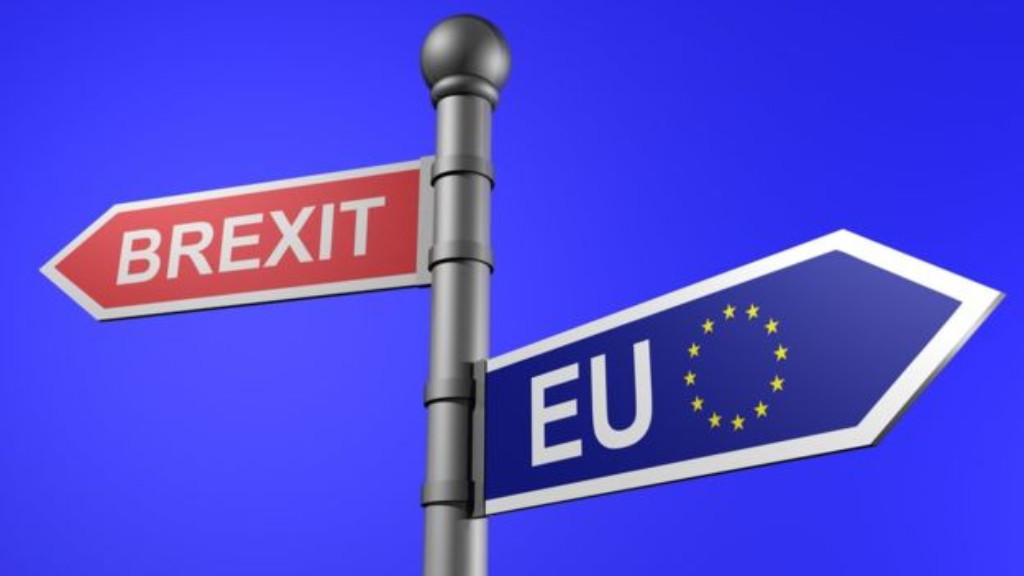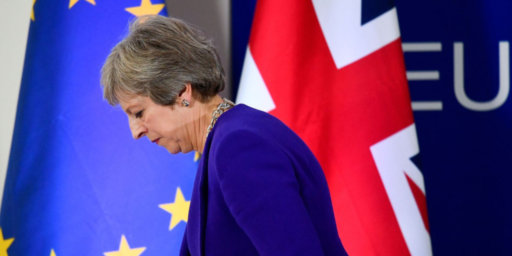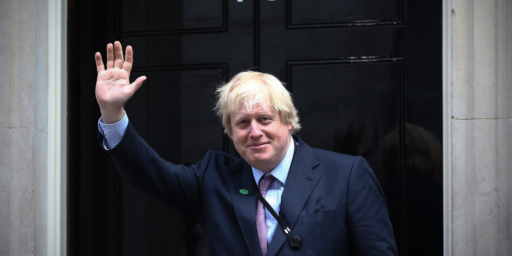House Of Commons Overwhelmingly Rejects Theresa May’s Brexit Deal
Theresa May's Brexit deal suffered the worst defeat in the modern history of the British Parliament, and nobody is sure what happens next.

Theresa May’s government suffered a humiliating defeat today in the House of Commons, with an overwhelming defeat of her negotiated Brexit deal that leaves the future of the United Kingdom and May’s government in significant doubt:
LONDON — Prime Minister Theresa May on Tuesday suffered a humiliating defeat over her plan to withdraw Britain from the European Union, thrusting the country further into political chaos with only 10 weeks to go until it is scheduled to leave the bloc.
The 432-to-202 vote to reject her plan was the biggest defeat in the House of Commons for a prime minister in recent British history, and it underscores how under Ms. May the prime minister’s office has lost ground in shaping important policy. Now factions in Parliament will seek to seize the initiative, an unpredictable new stage in the process of withdrawing from Europe, known as Brexit.
Immediately following the vote, the Labour Party leader, Jeremy Corbyn, citing the “sheer incompetence of this government,” announced that he was offering a motion of no confidence, which will be heard on Wednesday. That could in theory lead to a general election, but few analysts believe he can muster the necessary votes.
Before the vote, lawmakers in both the Conservative and Labour parties were being urged to put country before party to resolve the stalemate. Yet the problem remains that, even if they did, there is no clear path forward that can command a majority in the Commons.
In her final appeal in Parliament, Mrs. May impressed on the lawmakers the importance of the vote facing them. “The responsibility on each and every one of us at this moment is profound,” she said, “for this is a historic decision that will set the future of our country for generations.”
Like most others, though, the prime minister has no easy answers about the way forward. She has signaled that she will appeal to the European Union in Brussels for concessions and try again to win parliamentary approval, but the bloc is unlikely to grant her any.
She did accede to a tactic that some cabinet members had been pressing her on, calling for nonbinding ”indicative votes” that will allow members of Parliament to freely express their preferences for the various Brexit plans being bandied about.
The hope is that Mrs. May’s plan might emerge from that process with the highest level of support.
Negotiating the withdrawal from the European Union has been Mrs. May’s singular focus since she became prime minister, displacing social problems like housing and health care.
But her failure to build consensus behind a single vision of Britain’s future outside the 28-nation bloc has allowed painful divides in the country to deepen.
With no consensus behind any one pathway, and a vanishing window for further negotiation, more radical solutions are rising to the fore.
One group of lawmakers is campaigning for a repeat referendum, which could overturn the mandate to leave, and another favors leaving the European Union on March 29 without a withdrawal agreement, a move that experts warn could lead to shortages of some foods and an economic downturn.
“This is probably the most important piece of legislation for decades, and the executive can’t get it through,” said Tim Stanley, a columnist for The Daily Telegraph. “It’s a very dramatic moment.”
More from The Guardian:
Theresa May has sustained the heaviest parliamentary defeat of any British prime minister in the democratic era after MPs rejected her Brexit deal by a resounding majority of 230.
The prime minister immediately announced that she would welcome a vote of no confidence in her own government, and would make time for it on Wednesday.
The Labour leader, Jeremy Corbyn, quickly confirmed he had tabled the motion, with the support of the leaders of all other opposition parties.
Corbyn told MPs: “This is a catastrophic defeat. The house has delivered its verdict on her deal. Delay and denial has reached the end of the line.”
May said if she survived the vote – which appeared likely, after the Democratic Unionist party said it would back her – she would hold cross-party meetings with senior parliamentarians “to identify what would be required to secure the backing of the house”.
Brexit-supporting Conservatives joined with opposition parties and the DUP to trounce the government in the “meaningful vote”, which the prime minister delayed before Christmas in the vain hope of winning over waverers.
May began the eighth day of the Brexit debate by making a last-ditch plea to colleagues to support her, warning them not to break their promise to the British people to deliver Brexit.
“This is the most significant vote that any of us will ever be part of in our political careers. After all the debate, all the disagreement, all the division, the time has now come for all of us in this house to make a decision. A decision that will define our country for decades to come,” she said.
“Together we can show the people we serve that their voices have been heard, that their trust was not misplaced.
Earlier in the day, as one Conservative backbencher after another stood up to slam her painstakingly negotiated withdrawal agreement in the House of Commons, it became clear that few had changed their mind – though whips urged MPs to abstain, rather than vote against the government.
May herself embarked on a last-ditch charm offensive on Tuesday, holding meetings with MPs including the European Research Group’s Steve Baker, who said the pair had held a “constructive and substantial conversation about the future”.
Speaking just before the vote, the Labour leader, Jeremy Corbyn, said “the prime minister has treated Brexit as a matter for the Conservative party, rather than the good of the whole country”.
He called the government’s efforts to steer Brexit through parliament “one of the most chaotic and extraordinary parliamentary processes” he had experienced in 35 years as an MP.
The attorney general, Geoffrey Cox, had earlier warned his colleagues that if they did not accept the deal, they risked condemning Britain to the chaos of a no-deal Brexit. “It would be the height of irresponsibility for any legislator to contemplate with equanimity such a situation,” he said.
He argued that members of the public affected by no deal would say to MPs: “What are you playing at? What are you doing? You are not children in the playground. You are legislators, and this is your job.”
Both Labour and the Scottish National party withdrew amendments to the government’s motion at the last minute, to allow MPs a clean vote on the deal.
With just 73 days to go until Britain is scheduled to leave the European Union, lawmakers rejected — by a vote of 432 to 202 — the withdrawal deal that had been painstakingly negotiated between Prime Minister Theresa May and the European Union.
The landslide vote was pure humiliation for a British leader who has spent the past two years trying to sell her version of Brexit, and it increased doubts about how or whether Britain will leave the E.U. on March 29.
May stood almost alone, as many in her own party abandoned their leader.
Jeremy Corbyn, the opposition Labour Party leader, called the loss historic. He said her process of ”delay and denial” had lead to failure. He then introduced a motion of no-confidence, to be debated on Wednesday.
During the evening debate, as the members in the chamber hooted and jeered, the speaker gaveled the members to quiet, complaining of the ”noisy and unseemly atmosphere.”
“The House must calm itself. Zen!” John Bercow shouted.
Before the vote, May told Parliament that the choice was plain: support her imperfect, but practical, compromise deal — and the only one that Europe will abide, she stressed — or face the cliff edge of no-deal Brexit. May said that everyone who thought they could go to Brussels and get a better deal was deluding themselves.
But the vote was decisive.
May said she would reach out to members of Parliament to find out what Brexit deal, if any, they would endorse. Her office has been tight-lipped about what alternatives she might offer.
The debate in the chamber before the votes were cast was impassioned.
The rising Labour Party star David Lammy recalled how he had confronted his constituents who sympathized with the violence carried out by rioters in London in 2011. Now he said felt the same duty to confront his neighbors over Brexit.
“Why? Because we have a duty to tell our constituents the truth, even when they passionately disagree ,” Lammy said. “Brexit is a con, a trick, a swindle, a fraud.”
In an emotional speech, Geoffrey Cox, a Conservative lawmaker and the Attorney General, urged the chamber to back May’s deal to avoid legal uncertainties.
“You are not children in the playground, you are legislators — we are playing with people’s lives,” Cox said.
Historians scoured the past for comparisons for the scale of defeat.
Scholars had to go as far back as the 19th century to find a comparable party split and parliamentary defeat — to Prime Minister William Gladstone’s support for Irish home rule in 1886, which cut the Liberal Party in two.
“The events in Parliament today are really quite remarkable,” said Cambridge University political historian Luke Blaxill. “This doesn’t happen.” Meaning, usually British parties fight with one another in Parliament — but members don’t tear their own parties apart.
As things stand, it is entirely unclear where things go from here. As noted, the House of Commons will consider a vote of no-confidence in May’s government tomorrow, but she is expected to survive that notwithstanding her defeat on the Brexit bill. This is due to the fact that she’s not likely to lose the support of the Tory MPs who voted against the Brexit deal and because her coalition partners from the Democratic Unionist Party have already stated that they would support the government in tomorrow’s vote. Even with that behind her, though, May has to figure out what to do about Brexit, and the future does not look promising. Reportedly, the government has until Monday to negotiate concessions from the European Union to the Brexit deal that would gain Parliament’s support. That’s far easier said than done, though, since it’s apparent that the European Union’s Brexit negotiators are already indicating that there’s very little room for movement on their side:
E.U. diplomats who work on Brexit negotiations warned that they had nothing up their sleeve that could fundamentally shift the debate in Britain. And they said that May has yet to present them with a plan that she can guarantee would pass muster in her own parliament, leaving them puzzled about what precisely Britain wants more than two years into the process and whether they could offer anything to ease the deal over the finish line.
Although E.U. policymakers have said there would probably be some flexibility about the March 29 deadline for Britain’s exit from the E.U., any extension would have to be approved by leaders of all 27 remaining nations in the bloc, and there is little appetite to do so if it would do little to resolve the debate in Britain. Many capitals are bracing for a chaotic British exit and shifting their energies toward preparations to limit the damage.
Leaders said Tuesday that they would be happy to keep talking with May but that no radical changes were on offer.
“I do not think that there are any new solutions being put on the table that have nothing to do with what has already been negotiated and agreed,” German Foreign Minister Heiko Maas told reporters at a session of the European Parliament in Strasbourg, France.
If this effort to “fix” the Brexit deal fails, as seems it likely will, then the May government will be left with few alternatives, and the ones that are available are far from palatable.
The most obvious answer would be a so-called “hard” Brexit, which essentially mean a Brexit without any accompanying agreements regarding future trade between the United Kingdom and the European Union, no provisions regarding trade or the transfer of goods, services, and funds, no provisions regarding the status of U.K. nationals living abroad in E.U. member states, and no provisions regarding the status of the border between Northern Ireland and the Irish Republic, something that could easily and quickly become a point of contention that would threaten to unravel the peace and calm that has existed there for the past twenty years. Such an outcome would be potentially disastrous for Great Britain since it would potentially mean loss of access to goods from the continent, the closure of markets to British goods, and difficulties for British ships seeking to deliver goods to European ports.
Alternatively, the British Government and the European Union could agree to extend the Brexit deadline and either return to square one and try to come up with broader changes to the existing Brexit deal that would make it possible to get approval in the House of Commons. Given the comments from the E.U, negotiators above, though, that seems exceedingly unlikely. Despite that, though, this may end up being the way things proceed since neither party seems to relish the idea of a “hard” Brexit just two and a half months from now and there appears to be very little time between now and then to negotiate something that could get approval in the House of Commons in time for the existing March 29th deadline.
Another option would be that the May government could try to find a way to push the Article 50 deadline off indefinitely and resubmit the “leave” or “remain” options to a nationwide referendum like the one we saw in 2016. There’s presently no provision in British law for that, of course, but that could change with a simple majority vote in Parliament. The hope at that point, I presume, would be that this time the voters would come to the rescue of the government and change their minds on breaking off ties with the European Union. At this point, though, that’s just a theoretical idea.
Beyond all of that, there’s the question of what this means for Theresa May’s future as Prime Minister. As I noted, she’s likely to survive tomorrow’s no-confidence vote but her future beyond that is questionable even if she somehow manages to get out of the Brexit mess with some kind of face-saving outcome. She is relatively safe inside the Conservative Party given that she survived an intra-party no-confidence vote called by her opponents inside the party last month, meaning that such a motion cannot be brought again for another year. This doesn’t preclude the possibility though, that either some faction of Tory MPs might decide to withhold support in the event of a future no-confidence vote or that May would lose the support of the D.U.P., which would mean she would lose a future no-confidence vote. In that event, the most likely outcome would likely be another General Election, the third such election in the past four years and one that would occur three years before one would be required by governing law. In that case, everything would be up in the air, Brexit or no Brexit.
In any case, we are indeed in interesting times. Governments are in chaos on both sides of the Atlantic. We have an American President who talks about abandoning NATO and is presiding over a government shutdown that appears to have no end in sight, and a British Prime Minister who is separating her nation from Europe.
Guess who’s smiling?





What happens next?
I drink more.
Hic! Haec! Hoc!
That aside, see Ian Dunt
And Jon Worth’s what happens next diagram. (twitter link so I hope it works).
I saw elsewhere someone quoting a British friend saying, “No Deal Brexit is the best negotiating position. This is poker!”
This makes this thing seem remarkably similar to the shutdown in the sense of the mindset and negotiating strategy of one party. The ultimatum game rears its head.
We have in many ways the identical problem as the UK. In both cases voters who’d been lied to by their own media and politicians, and of course, Russians, chose to do something catastrophically stupid. And surprise, no matter how much you wish for a pony, the only pony available, is dead. There will be no pony. No painless Brexit, no wall, no way forward so long as voters are fcking idiots. Now what?
@Jay L Gischer:
Yes.
– EU lays down a royal flush. UK looks at own cards: Mr Bun the Baker, Pikachu, a Shadowmage, a fireball spell, and the Fool. (credit to Thomas Cogley)
@Michael Reynolds:
“If you can’t be a good example, then you’ll just have to be a horrible warning.”
I just can’t understand a country giving up it’s sovereignty, control of immigration, and it’s economy. The citizens will have little say over the policies, laws, regulations, and taxation. Evidently they don’t teach the American Revolution in their schools.
I have to wonder what kind of hold power has over people, when May pretty much, as in the old Far Side cartoon, is facing the choice between “Damned if you do” and “Damned if you don’t.” Me, I’d welcome a no confidence vote.
I don’t know what oath of office, or equivalent, is taken by a British PM, but I doubt it includes leading the country to ruin, or even risk of ruin. Again, if it were me, I’d make the case that a referendum is not a suicide pact, and that regardless of the vote, the choice now is between the deal as is, or remaining in the EU; under no circumstances should there be a “hard” Brexit.
Yes, I know that would end her career, but history would judge her well (perhaps). And in any case it’s not me, and that’s good for me.
A hard Brexit is the only one she can invoke. The EU will likely allow an Article 50 extension, but then what? The Brexit-ers can’t get what they want and are too delusional to realize it. The EU has every reason to make the UK’s withdrawal as painful and humbling as possible.
@Michael Reynolds: I suppose that a unicorn is out then too, right?
@Jay L Gischer:
And there is the problem in the nutshell. The pro-Brexiters think they are playing poker. The EU is looking into the room and seeing maniacally grinning Brits alone at a poker table, and wondering just what kind of madness is this?
@Kathy:
I understood why Cameron walked away back when he did. I understand even better now.
@MarkedMan: I suspect that soon the EU will–if it hasn’t already–realise that they’ve been caught up in an internal Tory party catfight (with Labour dancing around them hoping to swipe votes) and there is no way that any time granted will help sort out this matter. They are going to have to let the U.K. go over the falls in a barrel and sweep up the pieces later.
@Tyrell:
Your comment seems to me to indicate a lack of understanding of the functioning of the EU.
I can hardly blame you that much, though, as a considerable number of my fellow countrymen harbour similar delusions.
– Sovereignty is not given up; if it were the UK would no more be able legally to leave than a state of your Union can. Rather, sovereignty is shared: limitations on theoretical freedom to enable cooperation that increases practical capality.
– Control of immigration is limited only to the extent that there is free movement of labour required for a Single Market. EU states can deport EU nationals after 3 months if they do not have a job or independent means of support. Immigration of non-EU nationals is a state competence, not an EU one. Levels of border control vary depending on whether the country participates in the “Schengen visa area”. This is based on but not coterminous with EU; it excludes UK and Ireland, but includes Norway and Switzerland.
– As to control of the economy, it depends what you mean. The EU objective is to create a single continental scale economy based on free markets and competition.
So, yes, autarky is ruled out.
Also, states who are members of the Euro/ECB system aka Eurozone (UK, Sweden and Denmark are outside; most E. Europe countries are not in yet but intend to join) have limits on fiscal/monetary freedoms to enable a shared currency to function.
Product standards are an EU competence.
However, beyond these limitations, states retain control of taxation (within certain constraints re. completion law), labour regulation (ditto), environmental regulation etc.
Just as they retain power over e.g. health, welfare, education, criminal law, civil law, etc. etc.
– Suprisingly enough 🙂 , no, the American Revolution does not feature that prominently in the UK history curriculum.
@Just nutha ignint cracker: Cameron didn’t “walk away.” He was forced out because he created the Brexit mess.
The effects are incalculable at this point, although one obvious potential consequence is the accelerated breakup of the UK. I have friends in the Midlands who are vociferously pro-Brexit, but everything they post on the subject is from a purely English point of view. While I can’t see Northern Ireland agreeing to become part of the Republic, I could possibly see a Scotland-Northern Ireland federation emerging.
@JohnSF: First, very well explained. Second, I don’t know how long you’ve been reading but there is some debate as to whether Tyrell is actually the person he presents in his comments or a troll. If the later, then he is a cross between the traditional troll (doesn’t have any stake in what he says, but is posting simply to get indignant reactions) and the Ken M* variety.
*Ken M: greatest troll of all time. That’s just a fact.
@SC_Birdflyte: Both Scotland and Northern Ireland are getting incredibly shafted by Brexit. But the problem with such an alliance is that a) both countries are net drains on the British economy, and b) Spain, for one, will oppose EU membership for any country that has split off from any other, due to its internal separatist problem.
@MarkedMan: Sorry. Can’t agree that Ken M or anyone else is the greatest troll of all time. Not while David Brooks still lives.
@Just nutha ignint cracker:
Yes, but I’d think he should go around with a paper bag over his head, or move under a very heavy rock where no one will find him. after all, this mess is all his doing.
@gVOR08: But, gVOR08, you are just being unreasonable. If only pragmatic leaders from both sides could come together and form a third party, the groundswell of formerly apathetic voters would be astounding. And don’t forget, on the one hand, Tyrell* tortures baby bunnies, but on the other hand, his opponents have said mean things.
*Apologies to Tyrell, real or imagined…
@Tyrell: And nothing but peace and prosperity to show for it!